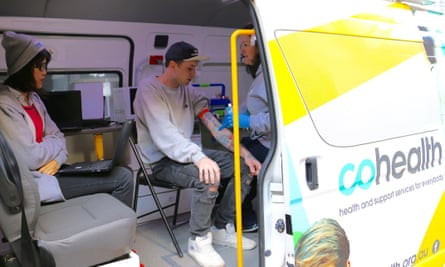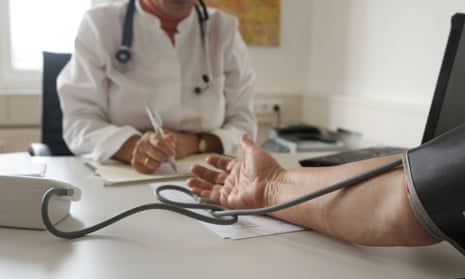Vulnerable Australians are missing out on adequate healthcare because the Medicare rebate is failing to keep up with the costs of providing services, leading to a critical GP shortage, community health organisations say.
Not-for-profit community health organisation Cohealth has not been able to operate its street doctor service in Melbourne’s CBD – which provides a GP to people sleeping rough – for more than nine months, because it cannot find a doctor to work there.
Cohealth nurse Vaan Phongsavan has been left to carry out the program. She now sees people in the CBD homelessness clinic instead of out on the road with the organisation’s bus.
“It was working well but the funding was basically grant money … [so] I have been working alone and the bus no longer runs, I see patients in the clinics,” Phongsavan said.
Last month, a patient came in with a very painful infected abscess in his mouth. Phongsavan spent hours trying to find a bulk-billing GP that would see him.
Cohealth had no free spaces and the closest bulk-billing clinic with a spare appointment charged $35 for an initial consult – money the man did not have.
Phongsavan eventually found the patient an appointment with a dental hospital but does not know if he received treatment.

She said most of the people she sees could benefit from also seeing a GP – to write scripts, perform cervical screenings or do a full checkup.
“Our clients are complex. In a 15-minute appointment you are not going to get very far,” she said.
“A lot of mainstream services can’t afford to do this because it is time-consuming and it’s expensive.”
The waitlist to see a Cohealth GP is long, and the struggle to recruit more doctors is driven by the massive pay disparity between public and private health models in Australia.
‘There are just no doctors’
Cohealth says the pay on offer to work in community health is about one-third of what a GP in private practice or hospitals would receive.
The current Medicare fee-for-service funding model is geared to high volume, short, transactional appointments, and is unsuitable for community health primary care, Cohealth’s chief executive, Nicole Bartholomeusz, said. It does not stretch far enough to meet the complex needs of vulnerable patients.
“Without good doctors working in community health, vulnerable clients are at risk of missing out on the kind of integrated care that they need,” Bartholomeusz said.
To deliver its service, Cohealth runs its GP programs at a “significant” loss – with the organisation covering the cost, she said. “While Medicare remains a fundamental part of Australia’s universal health care system, it needs to be enhanced to support those most in need.”
Cohealth is not the only organisation struggling to employ doctors.
Total Care Medical clinic is a bulk-billing practice in Frankston. Director, Lucina Wilk, said after losing four doctors across the pandemic, she had so far not been able to fill the positions.
“I’m down to one doctor and I have 6,000 active patients. I have a database of 30,000,” Wilk said.
“For clinics like mine, this is devastating.”
For a standard consultation, bulk-billing doctors receive about $38 from Medicare – but a doctor in a private practice will make about $85 for the same session, she said.
“There are no doctors – just no doctors. I am constantly advertising to get doctors. I’ve gone to about six recruitment agencies.”
To be able to afford to run the clinic, Wilk has started to charge private fees for some services – but wishes she didn’t have to.
“It’s a very, very tricky situation.”
From 2020 to 2021, just 67.6% of all GP patients had their consultation bulk-billed, according to the Productivity Commission’s Report on Government Services 2022.
‘Not a hope in hell’
For many, access to community healthcare is life-saving.
Indi Shanmugam, 57, was stabbed after a No Room For Racism rally in Melbourne in 2015. The wound caused a bacterial infection that spread to his spine.
“In the C7 [vertebra] near my neck they had to sever the nerve and put a metal plate in,” Shanmugam said.
“I lost everything below my chest. I couldn’t feel my legs.”
He was in hospital for a year before being discharged into an aged care facility. He started seeing Cohealth GP Dr Paul MacCartney regularly, who put him on a program to deal with his drug dependency and helped him get on to the NDIS and into independent housing.
Shanmugam said if it wasn’t for the Medicare rebate he would have to fork out thousands each year for his bills – which he just would not be able to afford.
“I can afford to live a comfortable life with just the pension that I am on now.”
Australian Medical Association vice president, Chris Moy, said there was “no bloody way … not a hope in hell” that community health services could continue under the current financial model.
The organisation has launched its Modernise Medicare campaign this election to demand extra funding for longer consultations, including after hours, and to provide more holistic care with pharmacists, dietitians and other allied health workers.
Neither Labor nor the Coalition has announced plans to increase GP Medicare rebates – and much of the election focus so far has been on whether Senator Anne Ruston, who would be health minister if the Coalition is re-elected, wants to privatise Medicare – a policy she publicly supported in 2015 before it was scrapped by the Coalition.
“The current rebate for a standard consultation – it’s $38,” Moy said. “It’s about the same as a men’s haircut, for a 20-minute consultation.
“The AMA’s position is we need to shift the funding model to favour practices that give high-quality care and are willing to go [the] extra mile and support their patients.”
He said both parties were letting down the public.
“You have the LNP government which has totally betrayed the sector by saying [the AMA’s plan] is the right thing to do, but are sending it to another committee – and Labor, who claim to be the friend of Medicare, but we haven’t seen anything substantial from.”
This story was corrected on 1 May 2022 to make clear that Cohealth’s street doctor service operates in Melbourne’s CBD.
